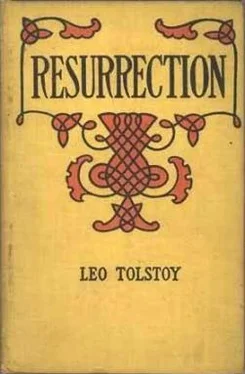Leo Tolstoy - Resurrection
Здесь есть возможность читать онлайн «Leo Tolstoy - Resurrection» весь текст электронной книги совершенно бесплатно (целиком полную версию без сокращений). В некоторых случаях можно слушать аудио, скачать через торрент в формате fb2 и присутствует краткое содержание. Жанр: Русская классическая проза, на английском языке. Описание произведения, (предисловие) а так же отзывы посетителей доступны на портале библиотеки ЛибКат.
- Название:Resurrection
- Автор:
- Жанр:
- Год:неизвестен
- ISBN:нет данных
- Рейтинг книги:4 / 5. Голосов: 1
-
Избранное:Добавить в избранное
- Отзывы:
-
Ваша оценка:
- 80
- 1
- 2
- 3
- 4
- 5
Resurrection: краткое содержание, описание и аннотация
Предлагаем к чтению аннотацию, описание, краткое содержание или предисловие (зависит от того, что написал сам автор книги «Resurrection»). Если вы не нашли необходимую информацию о книге — напишите в комментариях, мы постараемся отыскать её.
Resurrection — читать онлайн бесплатно полную книгу (весь текст) целиком
Ниже представлен текст книги, разбитый по страницам. Система сохранения места последней прочитанной страницы, позволяет с удобством читать онлайн бесплатно книгу «Resurrection», без необходимости каждый раз заново искать на чём Вы остановились. Поставьте закладку, и сможете в любой момент перейти на страницу, на которой закончили чтение.
Интервал:
Закладка:
“It is not at all funny,” said the gloomy member, and became gloomier still.
Then at last came the third member of the Court, the same Matthew Nikitich, who was always late. He was a bearded man, with large, round, kindly eyes. He was suffering from a catarrh of the stomach, and, according to his doctor’s advice, he had begun trying a new treatment, and this had kept him at home longer than usual. Now, as he was ascending the platform, he had a pensive air. He was in the habit of making guesses in answer to all sorts of self-put questions by different curious means. Just now he had asked whether the new treatment would be beneficial, and had decided that it would cure his catarrh if the number of steps from the door to his chair would divide by three. He made 26 steps, but managed to get in a 27th just by his chair.
The figures of the president and the members in their uniforms, with gold-embroidered collars, looked very imposing. They seemed to feel this themselves, and, as if overpowered by their own grandeur, hurriedly sat down on the high backed chairs behind the table with the green cloth, on which were a triangular article with an eagle at the top, two glass vases—something like those in which sweetmeats are kept in refreshment rooms—an inkstand, pens, clean paper, and good, newly-cut pencils of different kinds.
The public prosecutor came in with the judges. With his portfolio under one arm, and swinging the other, he hurriedly walked to his seat near the window, and was instantly absorbed in reading and looking through the papers, not wasting a single moment, in hope of being ready when the business commenced. He had been public prosecutor but a short time, and had only prosecuted four times before this. He was very ambitious, and had firmly made up his mind to get on, and therefore thought it necessary to get a conviction whenever he prosecuted. He knew the chief facts of the poisoning case, and had already formed a plan of action. He only wanted to copy out a few points which he required.
The secretary sat on the opposite side of the platform, and, having got ready all the papers he might want, was looking through an article, prohibited by the censor, which he had procured and read the day before. He was anxious to have a talk about this article with the bearded member, who shared his views, but wanted to look through it once more before doing so.
VIII
Swearing in the jury.
The president, having looked through some papers and put a few questions to the usher and the secretary, gave the order for the prisoners to be brought in.
The door behind the grating was instantly opened, and two gendarmes, with caps on their heads, and holding naked swords in their hands, came in, followed by the prisoners, a red-haired, freckled man, and two women. The man wore a prison cloak, which was too long and too wide for him. He stuck out his thumbs, and held his arms close to his sides, thus keeping the sleeves, which were also too long, from slipping over his hands. Without looking at the judges he gazed steadfastly at the form, and passing to the other side of it, he sat down carefully at the very edge, leaving plenty of room for the others. He fixed his eyes on the president, and began moving the muscles of his cheeks, as if whispering something. The woman who came next was also dressed in a prison cloak, and had a prison kerchief round her head. She had a sallow complexion, no eyebrows or lashes, and very red eyes. This woman appeared perfectly calm. Having caught her cloak against something, she detached it carefully, without any haste, and sat down.
The third prisoner was Maslova.
As soon as she appeared, the eyes of all the men in the court turned her way, and remained fixed on her white face, her sparklingly-brilliant black eyes and the swelling bosom under the prison cloak. Even the gendarme whom she passed on her way to her seat looked at her fixedly till she sat down, and then, as if feeling guilty, hurriedly turned away, shook himself, and began staring at the window in front of him.
The president paused until the prisoners had taken their seats, and when Maslova was seated, turned to the secretary.
Then the usual procedure commenced; the counting of the jury, remarks about those who had not come, the fixing of the fines to be exacted from them, the decisions concerning those who claimed exemption, the appointing of reserve jurymen.
Having folded up some bits of paper and put them in one of the glass vases, the president turned up the gold-embroidered cuffs of his uniform a little way, and began drawing the lots, one by one, and opening them. Nekhludoff was among the jurymen thus drawn. Then, having let down his sleeves, the president requested the priest to swear in the jury.
The old priest, with his puffy, red face, his brown gown, and his gold cross and little order, laboriously moving his stiff legs, came up to the lectern beneath the icon.
The jurymen got up, and crowded towards the lectern.
“Come up, please,” said the priest, pulling at the cross on his breast with his plump hand, and waiting till all the jury had drawn near. When they had all come up the steps of the platform, the priest passed his bald, grey head sideways through the greasy opening of the stole, and, having rearranged his thin hair, he again turned to the jury. “Now, raise your right arms in this way, and put your fingers together, thus,” he said, with his tremulous old voice, lifting his fat, dimpled hand, and putting the thumb and two first fingers together, as if taking a pinch of something. “Now, repeat after me, ‘I promise and swear, by the Almighty God, by His holy gospels, and by the life-giving cross of our Lord, that in this work which,’” he said, pausing between each sentence—“don’t let your arm down; hold it like this,” he remarked to a young man who had lowered his arm—“ ‘that in this work which . . . ’”
The dignified man with the whiskers, the colonel, the merchant, and several more held their arms and fingers as the priest required of them, very high, very exactly, as if they liked doing it; others did it unwillingly and carelessly. Some repeated the words too loudly, and with a defiant tone, as if they meant to say, “In spite of all, I will and shall speak.” Others whispered very low, and not fast enough, and then, as if frightened, hurried to catch up the priest. Some kept their fingers tightly together, as if fearing to drop the pinch of invisible something they held; others kept separating and folding theirs. Every one save the old priest felt awkward, but he was sure he was fulfilling a very useful and important duty.
After the swearing in, the president requested the jury to choose a foreman, and the jury, thronging to the door, passed out into the debating-room, where almost all of them at once began to smoke cigarettes. Some one proposed the dignified man as foreman, and he was unanimously accepted. Then the jurymen put out their cigarettes and threw them away and returned to the court. The dignified man informed the president that he was chosen foreman, and all sat down again on the high-backed chairs.
Everything went smoothly, quickly, and not without a certain solemnity. And this exactitude, order, and solemnity evidently pleased those who took part in it: it strengthened the impression that they were fulfilling a serious and valuable public duty. Nekhludoff, too, felt this.
As soon as the jurymen were seated, the president made a speech on their rights, obligations, and responsibilities. While speaking he kept changing his position; now leaning on his right, now on his left hand, now against the back, then on the arms of his chair, now putting the papers straight, now handling his pencil and paper-knife.
According to his words, they had the right of interrogating the prisoners through the president, to use paper and pencils, and to examine the articles put in as evidence. Their duty was to judge not falsely, but justly. Their responsibility meant that if the secrecy of their discussion were violated, or communications were established with outsiders, they would be liable to punishment. Every one listened with an expression of respectful attention. The merchant, diffusing a smell of brandy around him, and restraining loud hiccups, approvingly nodded his head at every sentence.
Читать дальшеИнтервал:
Закладка:
Похожие книги на «Resurrection»
Представляем Вашему вниманию похожие книги на «Resurrection» списком для выбора. Мы отобрали схожую по названию и смыслу литературу в надежде предоставить читателям больше вариантов отыскать новые, интересные, ещё непрочитанные произведения.
Обсуждение, отзывы о книге «Resurrection» и просто собственные мнения читателей. Оставьте ваши комментарии, напишите, что Вы думаете о произведении, его смысле или главных героях. Укажите что конкретно понравилось, а что нет, и почему Вы так считаете.












